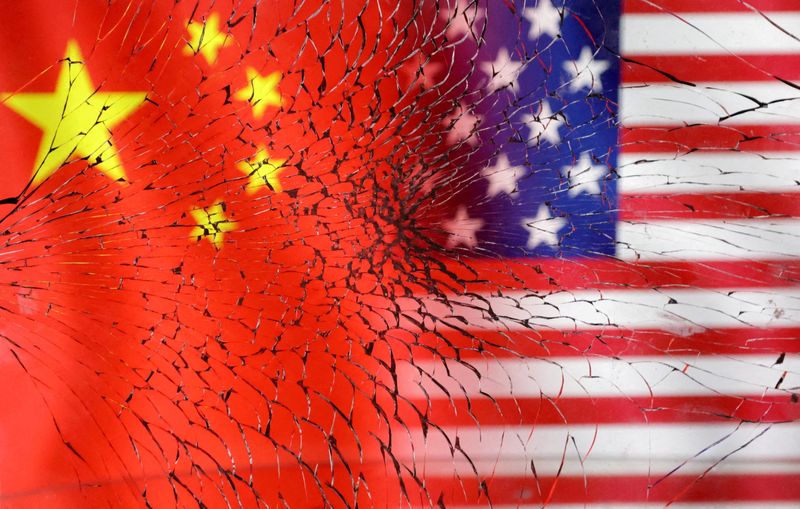By Karen Freifeld
(Reuters) - The U.S.-China tech war is all but certain to heat up no matter whether Republican Donald Trump or Vice President Kamala Harris wins the Nov. 5 U.S. presidential election, with the Democrat likely to come out with targeted new rules and Trump a blunter approach.
New efforts to slow the flow of less-sophisticated Chinese chips, smart cars and other imports into the U.S. are expected, alongside more curbs on chipmaking tools and highly-prized AI chips headed to China, according to former officials from the Biden and Trump administrations, industry experts and people close to the campaigns.
In her bid for the U.S. presidency, Democrat Harris has said she will make sure "America, not China, wins the competition for the 21st century," while Republican candidate Trump has pitched ever-increasing tariffs as a cure-all that includes combating Chinese technological advancement.
In short, the battle to keep U.S. money and technology from boosting China's military and artificial intelligence capabilities is bound to escalate under either Harris or Trump.
"We're seeing the opening of a new front on the U.S. China tech cold war that is focused on data, software and connected devices," said Peter Harrell, a former national security official in the Biden administration.
Last month, the U.S. proposed rules to keep connected cars made with Chinese components off America's streets, while a law was passed this spring that said the short video app TikTok must be sold by its Chinese parent by next year or be banned.
“There’s a lot of concern if a Chinese company is able to access and provide updates to devices,” Harrell said. “The connected car thing and TikTok are just the tip of the iceberg.”
Should Harris win the election, her approach would likely be more targeted and coordinated than Trump’s, people close to both administrations say.
For example, she is likely to continue working with allies much like the Biden administration has, to keep U.S. tech from aiding the Chinese military, Harrell said.
A Trump administration, on the other hand, may move more quickly, and be more willing to punish recalcitrant allies.
"I think we learned from President Trump's first term that he has a bias for action," said Jamieson Greer, former chief of staff to Robert Lighthizer, the U.S. trade representative under Trump who remains close to the campaign.
Nazak Nikakhtar, a Commerce Department official under Trump who knows his current advisors, expects a Trump administration to be "much more aggressive about export control policies towards China."
She anticipates "a significant expansion of the entity list," to capture affiliates and business partners of listed companies. The list restricts exports to those on it. Trump added China's Huawei Technologies to the list for sanctions busting.
Licenses to ship U.S. technology to China also are more likely to be denied, Nikakhtar said.
She said she would not be surprised if a Trump administration imposed restrictions not only on imports of Chinese chips but on "certain products containing those chips."
And she expects Trump to be tougher than Harris on allies who don't follow the U.S. lead. "The Trump philosophy is more of a stick," she said.
Bill Reinsch, a former Commerce official during the Clinton administration sees Trump as likely to take a "sledgehammer" to controls where Harris would use a "scalpel."
"Trump's approach has been across-the-board, most clearly seen in his current tariff proposals," Reinsch said.
Trump has said he would impose tariffs of 10 or 20 percent on all imports (not just Chinese) and 60 percent or more on Chinese imports.
Harris has described Trump's tariff plan as a tax on consumers, but the Biden administration has seen the need for targeted tariffs including increasing the rate on semiconductors from 25 percent to 50 percent by 2025.
China has repeatedly said it would safeguard its rights and interests. Last year, it targeted U.S. memory chip maker Micron Technology (NASDAQ:MU) after Washington imposed a series of export controls on U.S. chips and chipmaking equipment, and the U.S. accused Beijing of penalizing other U.S. companies amid growing tensions.
China also introduced export restrictions last year on germanium and gallium, metals widely used in chipmaking, citing national security interests. It issued new curbs on some graphite products that go into electric vehicle batteries in October 2023, days after the U.S. tightened rules on chip-related exports. And in June it unveiled new rules on rare earth elements critical for military equipment and consumer electronics.
Wilbur Ross, commerce secretary under Trump, said that the U.S. needs to be tough on China, but strategic, too, noting the U.S. is still dependent on China for rare earths.

"It would be very dangerous to just try to cut them off,"
he said.